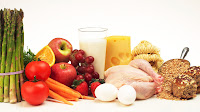It is important to know protein rich foods because protein is one
of the major biomolecules, and our body uses it to continue its normal
functioning. There are four major biomolecules: carbohydrates, lipids, proteins
and nucleic acids. Our body is made up from all four.
Protein is made up of amino acids. There
are twenty amino acids in total and nine out of those twenty are essential.
What we mean by essential is that our body is unable to synthesize those amino
acids and it must take them from an external source (food).
Muscles of our body are made up of
proteins. Protein also play many other vital roles within our body, therefore,
it is essential that you are consuming adequate amounts. Deficiency may lead to
muscular atrophy and many other disorders. If you diet is of high quality, and
contains sufficient amounts of protein, then most of the disorders that result
due to deficiency can be prevented.
Now we know what protein is and the role it play within our body.
We also know that deficiency may lead to muscular atrophy and other diseases.
So now we are going to list some of the common protein rich foods that people
consume to prevent deficiencies. The list of foods that is shown below is by no
means complete. But it does include the most common protein food sources out
there.
Have a look at the list of protein rich foods below for inclusion
in your diet plan. The number which appears beside the name of food represents
the amount of protein found per 100 grams.
·
Chicken
breast – 29g
·
Turkey
breast – 30g
·
Chicken
leg – 26g
·
Chicken
thigh – 24g
·
Fish
(of various kinds) – 16-26g
·
Mozzarella
cheese (low fat) – 32g
·
Cottage
cheese – 30-33g
·
Pork –
25g
·
Beef –
36g
·
Eggs –
13g
·
Tofu –
7g
·
Beans
– 17g
·
Peanuts
– 7g
We hope that this list of protein rich foods helps you make
decision about protein in your diet. Using this information you can see which
food products provide you the highest amount of protein so that you could
include it in your diet if needed. There is another thing that you must know
about protein, and that is the digestibility. Protein from different sources comes
with varying digestibility. Protein from some foods (such as beef) is easily digestible,
whereas protein from other sources might not. Have a look at this webpage about
PDCAAS, which explains the
digestibility of different protein in more details.

